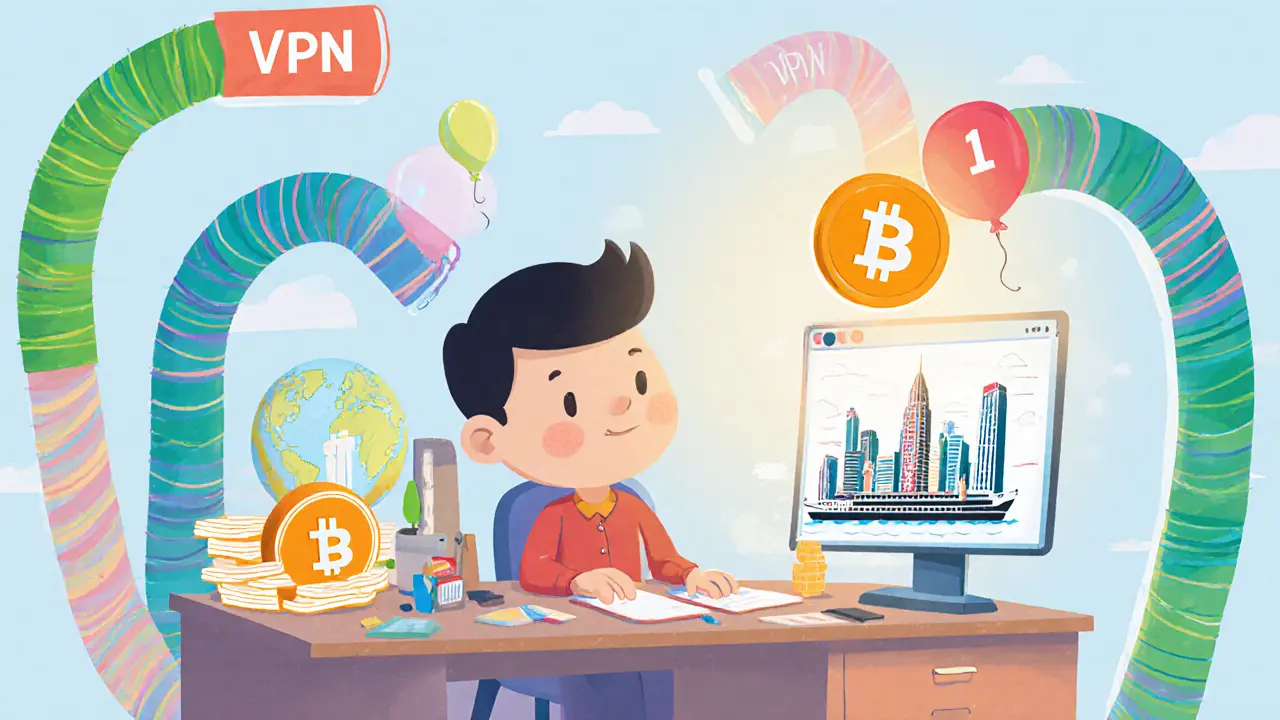China Crypto Trading Risk Calculator
Risk Profile Assessment
This calculator estimates the level of risk you might face if you participate in China's underground crypto trading ecosystem. Adjust the sliders to match your situation.
Your Estimated Risk Level
Adjust the settings and click "Assess My Risk Level" to see your risk assessment.
When people talk about crypto in China, they often picture a silent, hidden network that keeps humming despite the government’s bans. China underground crypto trading is a covert ecosystem of peer‑to‑peer deals, offshore brokers and VPN tunnels that moves billions of dollars each year. It isn’t a myth - data from Chainalysis shows $86.4billion flowed through Chinese wallets between July2022 and June2023, dwarfing even HongKong’s legal market. This article untangles how the market works, why it exists, and what risks anyone diving in should expect.
From Early Bans to a Full‑Scale Crackdown
The story starts in 2013, when the People’s Bank of China (PBOC) told banks to stop handling Bitcoin. Fast forward to 2017: domestic exchanges were shuttered, and in 2021 the PBOC issued a sweeping ban on all crypto trading and mining. Officially, only personal ownership of tokens like Bitcoin and Ethereum is tolerated, but any commercial activity is illegal.
In May2025, rumors of new limits on personal holdings surfaced, yet the courts later called crypto “legal property,” a paradox that keeps the underground market alive. Shanghai regulators are now chatting about stablecoins, hinting that the government might eventually carve out a narrow, controlled space for digital assets.
How the Underground Network Operates
The backbone of the hidden market is a mix of technology and geography. Traders rely on VPN services, sometimes chaining several together, to bypass the Great Firewall and reach foreign exchanges. Once online, they move funds through P2P trading platforms or trust OTC brokers that have built reputation systems and escrow wallets.
HongKong serves as the crucial bridge. Many mainland traders open HongKong bank accounts or set up corporate entities there to convert crypto into fiat without tripping mainland capital controls. Stablecoins, especially USDC and USDT, act as the “currency of choice” for these cross‑border moves because they lock in value while avoiding the volatility of Bitcoin or Ethereum during the conversion process.
Scale and Economic Footprint
Numbers make the hidden market hard to ignore. $86.4billion in crypto volume (July2022-June2023) translates to roughly 3% of China’s annual GDP. Large‑ticket retail trades - $10000 to $1million - are almost twice the global average, showing that sophisticated investors dominate the scene, not casual hobbyists.
To put it in perspective, HongKong’s legal crypto market moved about $64billion in the same period, despite operating under clear regulatory guidance. The underground Chinese market not only outpaces its neighbor but also fuels a shadow financial sector that is invisible to regulators.
Why Traders Keep Turning to Crypto
Two forces drive the demand: a lack of attractive domestic investment options and severe capital‑flow restrictions. The CSI300 index slumped 35% over three years, and major Chinese firms missed earnings forecasts for a tenth straight quarter, according to MorganStanley. Even a 2trillion‑yuan stimulus injection hasn’t restored confidence.
Crypto offers a way to diversify, chase higher yields, and hedge against a weak yuan. For many, it’s a pragmatic response to an environment where traditional stocks, bonds, and real‑estate have become low‑return or hard‑to‑access.

Risk Landscape: Legal, Financial, Operational
Legal risk is the most immediate threat. While owning Bitcoin may be technically allowed, any attempt to buy, sell, or exchange it can trigger asset seizure, hefty fines, or even criminal prosecution. Enforcement policies shift quickly - yesterday’s tolerated activity can become tomorrow’s crime.
Financial risk comes from price volatility, limited avenues to cash out, and the absence of consumer protection. If an OTC broker disappears, there’s no regulator to appeal to. Exchange‑rate swings can erode profits in a single day.
Operational risk includes platform downtime, VPN blocks, and counter‑party default. Many traders report that their VPNs get throttled after a few weeks of heavy use, forcing them to constantly switch providers or resort to private proxy networks.
Trader Playbooks: How the Community Adapts
Reddit threads and Chinese crypto forums reveal a surprisingly sophisticated playbook. A typical high‑net‑worth user will:
- Subscribe to three separate commercial VPN services and rotate them weekly.
- Maintain a HongKong corporate bank account for fiat conversion.
- Use stablecoins as an intermediate layer: convert Bitcoin to USDC, move the USDC through a HongKong exchange, then pull yuan via a local partner.
- Rely on a trusted network of OTC brokers with escrow contracts, often verified through mutual acquaintances.
Retail traders lean on WeChat groups and smaller P2P platforms, accepting higher counter‑party risk for convenience. Across the board, the community reports a lingering sense of anxiety - every new regulatory announcement can force a rapid overhaul of their entire workflow.
Future Outlook: Will the Underground Shrink or Grow?
Two trends suggest the hidden market isn’t going anywhere soon. First, Shanghai’s discussions on stablecoin regulation could create a semi‑legal channel that still requires offshore routing, effectively legitimizing part of the current flow. Second, the courts’ recognition of crypto as “legal property” gives individual holders a foothold that the government can’t easily erase.
However, the rise of the digital yuan (e‑CNY) threatens to siphon off some demand. If the state‑backed digital currency offers fast, low‑cost cross‑border settlement, traders might shift away from decentralized tokens. Still, the core tension - a desire for open‑ended returns versus a government’s appetite for control - means a shadow market will likely persist, morphing in response to enforcement intensity and global crypto adoption.
Key Takeaways
- The underground crypto market in China moved $86.4billion in a single year, equivalent to about 3% of national GDP.
- Traders survive using VPNs, HongKong banking links, stablecoins, and trusted OTC networks.
- Legal risk is high: authorities can seize assets or press criminal charges at any time.
- Financial and operational risks stem from volatility, lack of dispute mechanisms, and fragile technical infrastructure.
- Future policy hints (stablecoin rules, digital yuan expansion) may reshape but not erase the underground ecosystem.
| Metric | Underground (estimated) | Legal (HongKong‑linked) |
|---|---|---|
| Total volume (USD) | $86.4billion | $64billion |
| Average trade size | $75000 | $12000 |
| Legal protection | None | Full consumer safeguards |
| Regulatory risk | High - possible seizure | Low - compliant |
| Primary access method | VPN+OTC+HK banks | Direct exchange APIs |
Frequently Asked Questions
Is it illegal for Chinese citizens to own Bitcoin?
Personal ownership is not expressly prohibited, but any attempt to trade, sell, or use Bitcoin for payments violates the current bans and can lead to seizure or penalties.
How do traders move crypto out of Mainland China?
Most use a chain of VPNs to access overseas exchanges, then convert to stablecoins, route the funds through HongKong‑based bank accounts or OTC brokers, and finally cash out in yuan via trusted local partners.
What are the biggest financial risks?
Price volatility, inability to access legal recourse if a counter‑party defaults, and potential asset freezes by authorities are the top concerns.
Can stablecoins provide a safe gateway?
Stablecoins reduce conversion friction and limit exposure to crypto price swings, but they still rely on offshore infrastructure that can be disrupted by regulators.
Will the digital yuan replace underground crypto?
The e‑CNY offers fast, state‑backed transactions, yet many traders value the anonymity and open‑ended investment upside of decentralized tokens, so a full replacement is unlikely in the near term.


Greer Pitts
July 26, 2025 AT 05:40Wow, that's a wild ride for anyone trying to dodge the crackdown. I feel for those folks juggling VPNs and Hong Kong banks – it’s like trying to sprint through a maze blindfolded. Stay safe out there, and maybe keep a backup plan just in case.
Lurline Wiese
July 26, 2025 AT 14:00The sheer scale of that underground market reads like a thriller novel, except it’s real life. $86.4 billion moving under the radar is both awe‑inspiring and terrifying. The drama of constant cat‑and‑mouse with the regulators keeps the whole thing pulsing with tension.
Jenise Williams-Green
July 26, 2025 AT 22:20Honestly, it’s appalling that anyone would willingly flout the law for personal profit. The legal system is there to protect citizens, yet these traders treat it like a suggestion. When the state finally clamps down, the fallout will be massive, and we’ll all be left to pick up the pieces of a shattered financial trust.
Kortney Williams
July 27, 2025 AT 06:40Looking at the data, it’s clear that the underground market fills a vacuum left by restrictive domestic policies. Philosophically, it raises questions about individual autonomy versus state control. Participants are not just reckless gamblers; many are sophisticated investors seeking diversification against a stagnant domestic market. The reliance on stablecoins shows a pragmatic approach to mitigate volatility while preserving liquidity. Moreover, the use of Hong Kong entities underscores the importance of cross‑border financial ecosystems. While the legal risks are undeniable, the economic incentives appear to outweigh the potential penalties for many. In the end, it’s a complex interplay of risk, reward, and necessity.
Adarsh Menon
July 27, 2025 AT 15:00Sure, just hop on a VPN and pretend the Great Firewall is a suggestion.
Laurie Kathiari
July 27, 2025 AT 23:20These crypto pirates are nothing but opportunists exploiting a broken system. Their so‑called “financial freedom” is a thin veil for evading taxes and laundering money. When the crackdown finally hits, the chaos they create will harm ordinary citizens more than any alleged benefit.
Jim Griffiths
July 28, 2025 AT 07:40Key tip: diversify across stablecoins and keep multiple VPN subscriptions to avoid single points of failure.
Matt Nguyen
July 28, 2025 AT 16:00The clandestine nature of China’s crypto underworld invites a multitude of speculative narratives that often escape rigorous scrutiny. It is incumbent upon the discerning analyst to separate hyperbole from substantiated phenomenon. While mainstream discourse fixates on the headline figure of $86.4 billion, the underlying architecture comprises a lattice of offshore entities, encrypted tunnels, and a cadre of technocratic intermediaries. These intermediaries, contrary to popular myth, are not mere hobbyists but seasoned financiers with pedigrees in traditional capital markets. Their operational protocols reveal a deep understanding of both cryptographic mechanics and geopolitical risk management. The reliance on stablecoins, for instance, serves not merely as a hedge against volatility but as a conduit for circumventing capital controls with surgical precision. Moreover, the persistent use of Hong Kong banking channels underscores a strategic exploitation of jurisdictional arbitrage. It would be naïve to attribute this sophistication to a monolithic “black market” without acknowledging the stratified governance structures that emulate legitimate financial institutions. The regulatory response, characterized by episodic crackdowns, often fails to account for this adaptive resilience. In fact, each policy tightening appears to catalyze an evolutionary leap in operational secrecy, akin to a biological arms race. Observers who dismiss these dynamics as mere law‑breaking miss the broader systemic implications for global capital flows. The spillover effects manifest in altered liquidity patterns on peripheral exchanges and skewed price discovery mechanisms. Furthermore, the clandestine channels inadvertently provide a feedback loop for state actors seeking to monitor illicit capital movements. This duality-whereby the underground network both evades and informs state surveillance-creates a paradox that challenges conventional regulatory paradigms. Ultimately, any meaningful engagement with this phenomenon necessitates a multidisciplinary approach that integrates cryptography, international law, and macro‑economic theory. To ignore these complexities would be an intellectual dereliction of duty on the part of policymakers and scholars alike.
Cynthia Rice
July 29, 2025 AT 00:20The interplay between VPN reliability and broker trust is a delicate dance that can break at any moment.
Promise Usoh
July 29, 2025 AT 08:40From a philosophical standpoint, the tension between state sovereignty and individual financial autonomy is not merely legalistic but existential. The Chinese government's assertive stance reflects a broader desire to control capital as a means of consolidating power. Conversely, participants in the underground market assert a claim to personal agency, leveraging technology to circumvent imposed boundaries. This dialectic shapes the evolving landscape of digital assets within the region.
Shaian Rawlins
July 29, 2025 AT 17:00I totally get the excitement you described, and I think it’s vital we keep the conversation respectful. While the numbers are shocking, we should also consider the human stories behind them – families trying to protect savings, entrepreneurs seeking new avenues. By sharing knowledge and safety tips, we can help mitigate some of the risks you highlighted without turning the community into a battleground.
Tyrone Tubero
July 30, 2025 AT 01:20While the previous exposition dazzles with verbosity, it overlooks the pragmatic reality that most participants are simply chasing yields. The grandiosity masks a very grounded motive: profit. In the end, the market’s movements are dictated less by ideology and more by cold arithmetic.
Taylor Gibbs
July 30, 2025 AT 09:40If you’re thinking about dipping your toe into this space, start small and keep records of every transaction. It’ll save you a ton of headaches if regulators ever sniff around. And remember, community forums can be great places to learn the ropes.
Rob Watts
July 30, 2025 AT 18:00Stay sharp and stay safe keep your VPNs updated and never trust a broker without references
Bhagwat Sen
July 31, 2025 AT 02:20Good point Jim, but also consider that relying on multiple VPNs can raise your profile with ISPs, potentially triggering deeper surveillance. Diversify your exit strategies as well.
Cathy Ruff
July 31, 2025 AT 10:40People who think this underground thing is some cool rebel vibe are just naive idiots. They don’t realize they’re feeding a black market that harms real economies.
Amy Harrison
July 31, 2025 AT 19:00Hey everyone! 🌟 Keep sharing your experiences – the more we learn together, the safer we all become! 🙌
Miranda Co
August 1, 2025 AT 03:20Exactly, Taylor. Starting small is key, but also set a strict loss limit. Otherwise you’ll get burned fast.
mukesh chy
August 1, 2025 AT 11:40Sure, the market is “underground” because it’s too cheap for regulators to bother. They’re just too busy chasing real problems.
Marc Addington
August 1, 2025 AT 20:00All this foreign crypto chatter just shows how unpatriotic some folks are, putting China’s interests at risk for personal gain.
Amal Al.
August 2, 2025 AT 04:20While I understand the concerns expressed, it is important to acknowledge that individuals may have diverse motivations, and blanket condemnation may not foster constructive dialogue.
Natalie Rawley
August 2, 2025 AT 12:40Honestly, the drama surrounding these crypto ops could power an entire season of reality TV – the betrayals, the secret meetings, the high‑stakes gambles.
Scott McReynolds
August 2, 2025 AT 21:00The evolution of this hidden market is a fascinating case study in human resilience and ingenuity. When traditional avenues close, people turn to alternative mechanisms to preserve wealth and seek growth. The intellectual curiosity that drives them to master VPN configurations, stablecoin economics, and cross‑border banking is commendable. It also reveals a deeper philosophical tension between control and freedom. As we watch these dynamics unfold, we gain insight into how societies adapt to regulatory pressure. The lessons learned here could inform future policy decisions worldwide. Moreover, the collaborative spirit within crypto forums demonstrates how collective knowledge can mitigate individual risk. Ultimately, this saga underscores the perpetual dance between authority and the desire for self‑determination.
Alex Gatti
August 3, 2025 AT 05:20Rob’s point about updating VPNs is solid but what about the fact that many providers log data? Might be worth rotating IPs too
John Corey Turner
August 3, 2025 AT 13:40One can’t help but marvel at the kaleidoscopic tapestry of risk, reward, and regulatory dance that paints this underground crypto scene. Each thread, from stablecoin bridges to Hong Kong banking corridors, weaves a narrative that is both alluring and perilous.
Katherine Sparks
August 3, 2025 AT 22:00Dear community, I appreciate the sharing of insights and would like to extend a heartfelt thanks for the collective wisdom. Let us continue to support each other with kindness and diligence in navigating these complex waters.
Kimberly Kempken
August 4, 2025 AT 06:20All this poetic fluff forgets the cold truth: most of these traders are just gamblers hoping for a quick win, and the rest is just noise.
Eva Lee
August 4, 2025 AT 14:40The synergy between decentralized finance protocols and offshore liquidity pools creates a frictionless conduit that effectively sidesteps conventional compliance frameworks, thereby amplifying systemic risk.
stephanie lauman
August 4, 2025 AT 23:00It is evident that shadow banking networks are being orchestrated by covert cabals to destabilize sovereign monetary policy – a fact the mainstream media deliberately obscures. 🕵️♀️
Twinkle Shop
August 5, 2025 AT 07:20The discourse you’ve cultivated, Scott, elegantly captures the macro‑level implications of a decentralized underworld intersecting with state‑level monetary strategies. By employing a lexicon that bridges economic theory and cryptographic praxis, you provide a scaffold for interdisciplinary dialogue. Such an approach not only enriches the community’s understanding but also equips policymakers with nuanced perspectives. It is through this synthesis that constructive regulatory frameworks may eventually emerge. Consequently, the continued exchange of sophisticated insights remains paramount.